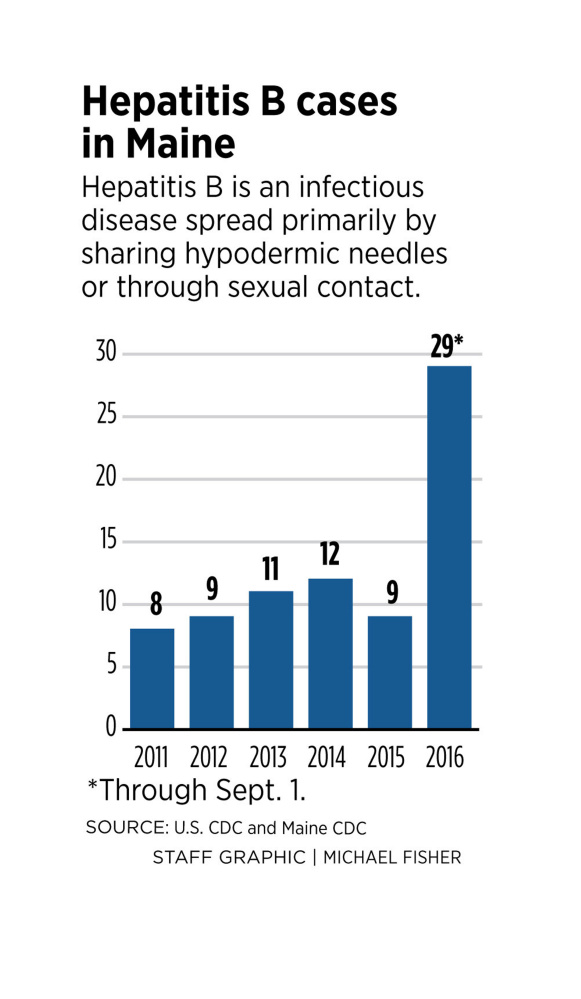While the heroin crisis has fueled a spike in Maine overdose deaths, addicts sharing needles has likely contributed to another public health problem – a rise in hepatitis B cases.
Through Sept. 1, the Maine Center for Disease Control and Prevention reported 29 cases of acute hepatitis B, more than twice as many as the dozen cases that occurred in 2014. In a typical year, Maine would have fewer than 10 hepatitis B cases.
So far in 2016, Maine has a rate of 2.2 hepatitis B cases per 100,000 persons, more than twice the national average in 2014, the most recent year for which federal statistics are available.
Eleven of the cases were in Penobscot County, five in Hancock County, and the remaining counties had two or fewer cases each.
The Maine CDC says sharing needles is a major risk factor for hepatitis B, a viral infection that causes liver damage, with symptoms that include fever, nausea, vomiting, fatigue, abdominal pain, dark urine and jaundice. During a May update on hepatitis B, nearly 90 percent of those infected were IV drug users, according to the Maine CDC.
Maine saw an increase in hepatitis C cases in 2014 and 2015, but at 11 cases so far this year, it is below the pace of the past two years, when there were 31 hepatitis C cases in 2014 and 30 in 2015.
John Martins, Maine CDC spokesman, said the state is accelerating its public education on hepatitis B and encouraging vaccination. Adults can be vaccinated for hepatitis B, and there are 13 locations across the state that offer free vaccinations.
“The Viral Hepatitis Program has been active with many projects, including the distribution of materials to educate (health care) providers on prevention, testing and immunization requirements. There have been vaccination clinics and other training activities as well,” Martins said in an email response to questions.
The state epidemiologist, Dr. Siiri Bennett, wasn’t available for comment Friday.
Maine experienced a record 272 drug overdose deaths in 2015 – most caused by heroin or the abuse of prescription opioids – and the state this year is on pace to break last year’s record, with 189 cases through June 30. Dr. Dora Anne Mills, vice president of clinical affairs at the University of New England and a former Maine CDC director, said needle exchange programs and vaccinations should be boosted as much as possible to limit the spread of hepatitis B.
“This disease is entirely preventable,” Mills said. “To vaccinate would cost pennies compared to the cost of treating hepatitis B.”
Mills said the needle exchange programs – where users can get access to clean needles – are effective and should be expanded. Currently, Maine has needle exchange programs in Portland, Augusta, Ellsworth, Bangor, Machias and Lewiston. A bill encouraging the expansion of needle exchange programs was approved by the Legislature this year and survived a veto by Gov. Paul LePage, but so far there have not been any new needle exchange programs created. The bill originally included $75,000 in funding to expand needle exchange programs, but the funding was later stripped from the bill.
“They are very efficient at not only reducing risk for hepatitis C, B and HIV, but also helping people get into treatment,” Mills said.
Dr. Caroline Teschke, director of India Street Clinical Services in Portland, which runs the needle exchange program, said the program helps, but it’s difficult to prove how many cases have been prevented. She said those who come in to get needles are encouraged to get vaccinations if they haven’t previously been immunized.
“It is extremely important that anyone at risk of infectious hepatitis get this vaccination,” Teschke said. “We do a lot of public education and pass out personal hygiene kits. You can also get hepatitis B by sharing toothbrushes.”
Copy the Story Link
Send questions/comments to the editors.




Success. Please wait for the page to reload. If the page does not reload within 5 seconds, please refresh the page.
Enter your email and password to access comments.
Hi, to comment on stories you must . This profile is in addition to your subscription and website login.
Already have a commenting profile? .
Invalid username/password.
Please check your email to confirm and complete your registration.
Only subscribers are eligible to post comments. Please subscribe or login first for digital access. Here’s why.
Use the form below to reset your password. When you've submitted your account email, we will send an email with a reset code.